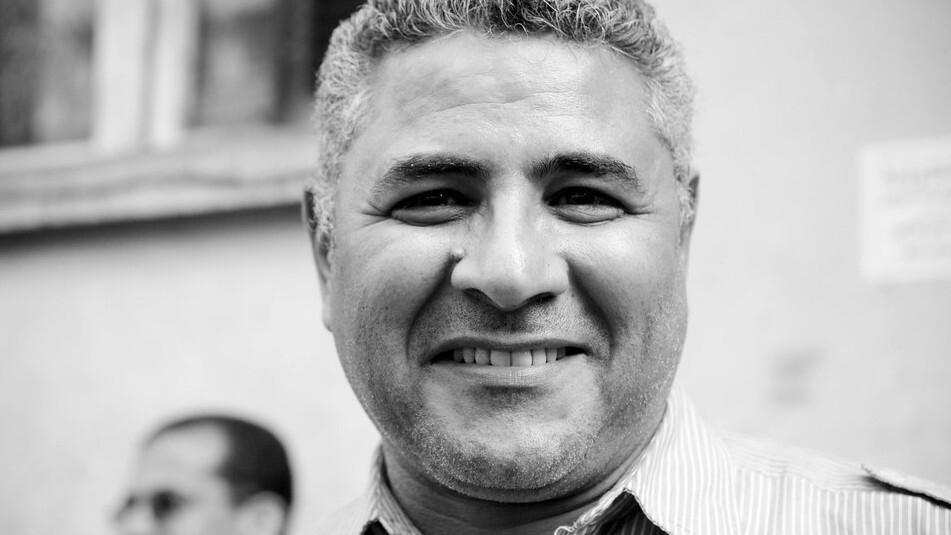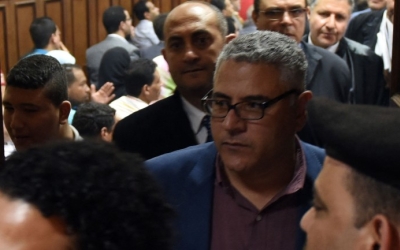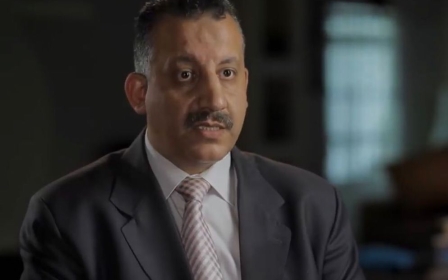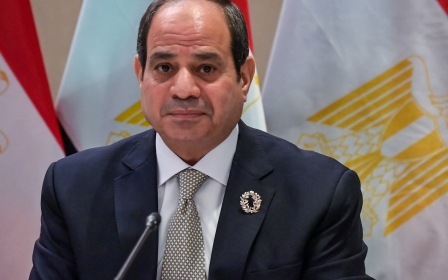Egypt: 'We cannot surrender to dictatorship,' says rights group founder

Gamal Eid, founder and executive director of the Arabic Network for Human Rights Information (ANHRI), is reflecting on the decision his group took in January to suspend its activities.
'There have been many attempts to forcibly recruit several team members to work as spies for the security forces'
- Gamal Eid, founder, ANHRI
"I have never seen a deterioration of the justice system like this," he told Middle East Eye. "The system is close to collapse. I am afraid people will lose faith in justice and the law's capacity to protect them."
On 10 January, ANHRI posted a message to its website: "In the absence of the bare minimum of the rule of law and respect for human rights, The Arabic Network for Human Rights Information decides to suspend its activities."
It was a bitter blow for an Egyptian human rights and activist community that is at a particularly low ebb.
Founded by Eid, a human rights lawyer, and a group of other lawyers and activists in 2004, the organisation documented violations against citizens, journalists, and political prisoners in Egypt and across the region.
New MEE newsletter: Jerusalem Dispatch
Sign up to get the latest insights and analysis on Israel-Palestine, alongside Turkey Unpacked and other MEE newsletters
It also monitored the increasing government intimidation and targeting of human rights workers and others.
Security forces looking for spies
Operating in increasingly dire circumstances, the group's suspension statement referred to "growing violations against human rights, which do not spare independent human rights organisations and defenders, and an increase in police harassment, whether under a legal or judicial pretext, or through explicit persecution".
Two of ANHRI's workers are currently in prison, Eid said. Others have been arrested, violently assaulted, robbed, and subjected to illegal summons.
For 11 years, the group has been one of those accused in Egypt's case 173, which has imposed charges of varying degrees of severity on organisations over accusations of "foreign funding," among other things.
According to ANHRI's statement, the restrictions placed on it by case 173, which included preventing it from registering or dealing with official bodies, were compounded by a demand for the group to change its name and stop working on "freedom of expression and prison conditions," even though those causes have been fundamental to the group since its inception.
Revealing the lengths taken by the authorities to undermine the group's work, Eid told MEE that "there have been many attempts to forcibly recruit several team members to work as spies for the security forces".
Members of the organisation were, Eid said, called by the security forces to "urge them to abandon their employment with us or work covertly with the security forces.
"I don't want anyone to give up their freedom because of me, but I can handle the consequences of my attitudes."
The lawyer, who has represented some of the most prominent secular detainees in Egyptian prisons, branded the government's 2019 civil society and NGO law as "unfair," saying it forced his group to become one that "ignores abuses because it is necessary". Human Rights Watch has called the law "draconian," while Amnesty says it is "outrageous".
Climate of repression
Since Egyptian President Abdel Fattah el-Sisi came to power in a 2013 military coup, the government has engaged in a widespread crackdown on dissent that has jailed thousands and stifled many of the country's civil society groups, according to rights groups.
The country is ranked among the world's worst jailers of journalists, along with Turkey and China, according to the Committee to Protect Journalists.
"Under the Sisi administration, the Egyptian human rights movement has experienced an unparalleled drop in the number of its organisations and members as a result of the state's relentless intimidation and persecution," according to the Cairo Institute for Human Rights Studies, an independent NGO.
Meanwhile, the institute says that a "state security-led media campaign against any publications by human rights organisations exposing severe crimes in the nation continues.
"ANHRI will not be the last human rights organisation compelled to halt operations rather than register under the arbitrary and authoritarian NGO law, which intends to systematically eliminate civil society and weaken its humanitarian and development function."
The NGO law bars human rights groups from engaging in any "political action that may threaten national security," which Eid saw as a prohibition on his group's operations.
"Security agencies can replace and take the administration," he said. "We require security permission to establish everything linked to the organisation, including a name, business, and bank account. Security actors can alter and gain control."
The lawyer remains defiant
In 2016, as part of Case 173, a court ordered the freezing of Gamal Eid's assets and banned him from travelling. He is forbidden from signing documents or opening bank accounts.
"They prevent us from travelling in order to make us prisoners and hostages," Eid said.
Eid says he has been physically assaulted, subjected to attempted kidnapping, and was severely beaten in a street near his home. The work he has done has come with enormous risks and has taken a great toll.
'As for the current regime, it is more brutal than Hosni Mubarak's... They rule people with the tank'
- Gamal Eid
"I am afraid, and this is the nature of any human being. But when I choose between being scared or complicit in abuse, I will select fear," Eid says.
"It is better to be on guard all the time and afraid than to be a hypocrite of the ruling system. Even being silent, that security won't accept, you have to defend them until they accept you, they don't get me even in the middle, so I'll keep going even if I'm scared."
Defiant, he said that suspending the network's work was not a defeat or a surrender, but rather, as he put it, a warrior's break.
"We cannot surrender to dictatorship and the deprivation of the state of justice and human rights," said Eid.
"As for the current regime, it is more brutal than Hosni Mubarak's. The current government was more popular than Mubarak's at the very beginning, but now it has lost all that popularity... In the last 10 years of Mubarak's rule, he was starting to rule everything with repression. But the current regime began its rule with repression. People are forbidden from talking about politics. They rule the people with the tank."
In all this, the human rights lawyer still sees some cause for hope.
"Throughout history, we see that people can only be ruled by repression if regimes also improve people's lives," Eid said. "If this regime represses and does nothing good for the people, it cannot continue."
Middle East Eye delivers independent and unrivalled coverage and analysis of the Middle East, North Africa and beyond. To learn more about republishing this content and the associated fees, please fill out this form. More about MEE can be found here.






